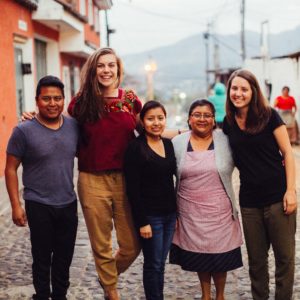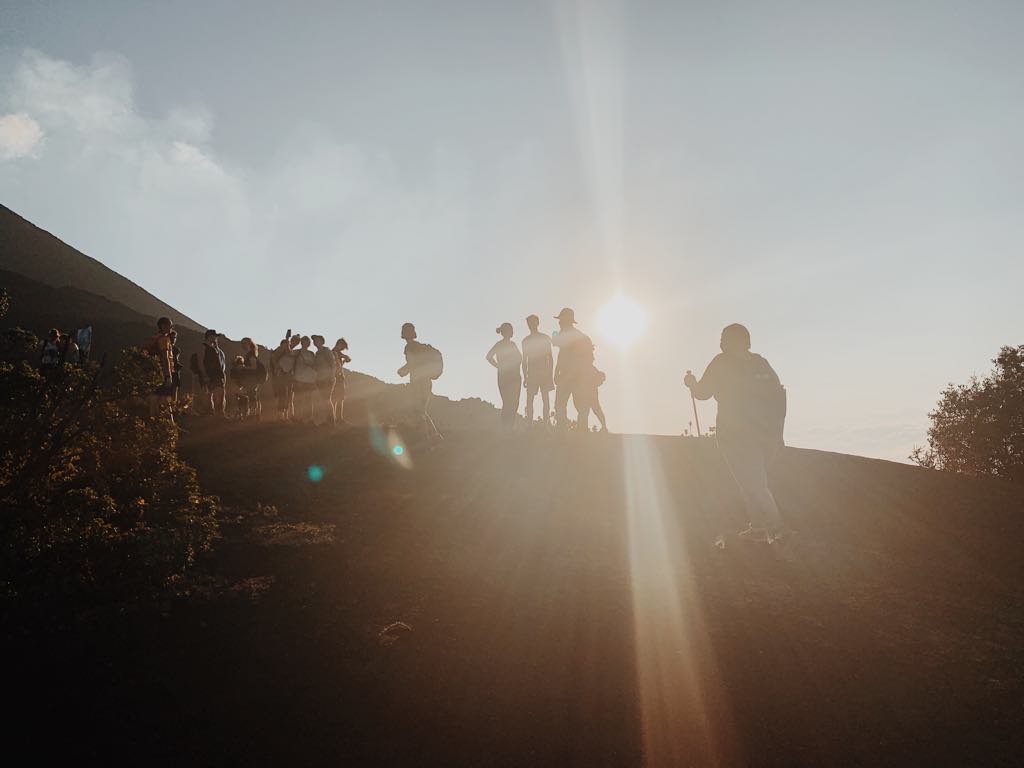One afternoon, I was sitting with a student in a café in Antigua, Guatemala in the midst of a conversation about life after Outtatown. I asked them what they were hoping to walk away from Outtatown with and they respond saying, “I’m not really sure…I have noticed lots of [students] talking about wanting to have figured out their theology or their career path; but it doesn’t seem likely to have everything figured out by the end, does it?”
Recently, I have been pondering the word arrive. The primary definition, according to Merriam Webster, is “to reach a destination”. When I hear this word it feels seemingly finite, even the colloquial use “to achieve success” sounds like it is describing the end of a journey. During Outtatown we use this word quite practically as we communicate with our students and partners; when we are travelling, when we will arrive at Spanish class, when we will return to Canada, etc.
When I think back to the conversation with the student in the café there is another use for the word arrive that rolls around in the minds of the Outtatown community—arriving at the “right” conclusions. There’s a temptation to think we need to arrive at the end of Outtatown having arrived at the “right” conclusions related to theology, about knowing ourselves, understanding the world, or determining the “right” plan for after program. However, as I think of the ways we use the word arrive I realized that it not only describes an end, but also implies a beginning. When we arrived in Guatemala, it ended our time at home in Canada, but then our semester began in a new place. When we arrive back in Canada it will mean that Outtatown is over, but also means the start of something new for each person in our community.
In light of all this, I don’t think the desire to arrive in our thoughts, feelings, or decisions is wrong, but there is a call to reorient ourselves to what it means to arrive. Instead of marking a finish line or conclusion we should see these arrivals as Ebenezer moments. In 1 Samuel 7 we find Samuel, a prophet and leader of Israel, who is about to set up an altar after the people of Israel were victorious over the Philistines. “Then Samuel took a stone and set it up between Mizpah and Shen. He named it Ebenezer, saying, “Thus far the LORD has helped us.” (1 Samuel 7:12). Samuel marked this place to remember how God had helped them arrive at this point and how the Lord would continue to be faithful on their journey.
Before becoming an Outtatown Site Leader, I had heard many stories from close friends and peers who had been students or Site Leaders. In their recollections and in my own experience, it is evident that Outtatown is a not a means to an end but rather a significant Ebenezer moment for all alumni. It is not arriving at any conclusion or finish line, but a marker in the greater journey of knowing God, yourself, and the world. So as we have arrived at the half way point in our final semester, I hope we can continue to trust God in the greater journey and not focus on the anxiety of needing to figure out the future before landing in Canada. May we be able to hold these Ebenezer moments not as finish lines, rather as expectations of growth, challenges, joys, and sufferings in this journey that will continue to push us forward past each point of arrival.
– Karissa Durant, Guatemala Site Leader, 2019-2020

Meeting Christ in the Struggle
On a Wednesday evening a few weeks ago, I found myself riding the bus from Antigua to San Juan del Obispo—a tiny village on the side of a volcano that Outtatown students call home for six weeks. Earlier in the week, I had watched students bravely meet their host families. As their names were called, each student collected their bags and then left their community behind. Now it was time for me to step into the world of host families, learn the Spanish language, and linger over long dinners. The difference was, I wasn’t heading to San Juan to meet a new family. In a sense, I was returning home.
Years prior, I had the opportunity to be a Site Leader and live with a local family. Near the entrance of San Juan sits a family home that has housed every female Outtatown Site Leader since the start of the Guatemala program. Its quiet garden and courtyard have been a gracious retreat from the hustle and bustle of a busy semester, year-after-year. The real heart of this home is its kitchen. Outfitted with a table large enough to seat at least 10 and the steady presence of family members making tea, preparing dinner, chatting and laughing together, the kitchen is where this home comes to life. On that cool Wednesday evening this past January, I felt the same sense of relief and security I had felt as I sank down into a seat around the table. It was good to be back.
Of course, it didn’t always feel this way. During the evening, I was reminded of the sheer exhaustion of communicating across a language barrier; the frustration of having your vocabulary reduced to that of a small child; the uncertainty of never being confident what the conversation is about. I was reminded of the challenge of not being able to fully express myself to those around me. I was reminded that these challenges ebb and flow. They are not linear and they don’t resolve themselves in timely, tidy fashion.
That evening as we ate, chatted, stumbled, and laughed, I was reminded of the frustration, challenge, and sheer joy of being in the company of people who embrace me. Despite the language barrier making it difficult for them to know many details about me, they listen, are patient, and care for me anyway. The work of cross-cultural learning takes courage and heart, and a lot of grace.
Bravery on Outtatown takes a lot of different forms. Sometimes it looks like squeezing through a tight cave by lamplight, or jumping off a bridge with a cord strapped to your feet. But sometimes it looks like a clumsy Spanish sentence tumbling out of your mouth, even after you’ve rehearsed it perfectly. Sometimes it is being honest that things are hard, and making space for others to say, “Hey, me too!” The following evening, I had the joy of joining the site for a worship evening. After we sang, students took time to share things that had been challenging, but also where they had seen Christ that week. I was reminded that even when things can be hard, it is here that we meet Christ.
– Renee Willms, Outtatown Co-Director

